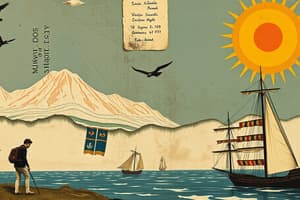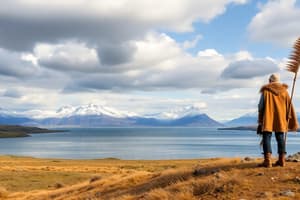Podcast
Questions and Answers
What was one of the primary economic activities that European fishermen engaged in off the coast of Newfoundland?
What was one of the primary economic activities that European fishermen engaged in off the coast of Newfoundland?
- Mining gold and silver
- Whaling
- Cotton farming
- Cod fishing (correct)
During which voyage did Jacques Cartier claim land for France by planting a cross?
During which voyage did Jacques Cartier claim land for France by planting a cross?
- Third Voyage
- First Voyage (correct)
- Second Voyage
- Exploratory Visit
What was a key goal of Jacques Cartier's voyages to the New World?
What was a key goal of Jacques Cartier's voyages to the New World?
- Create alliances with the British
- Find a western route to Asia (correct)
- Increase agricultural output
- Establish a trading post
What was the primary role of the Catholic Church in New France?
What was the primary role of the Catholic Church in New France?
What describes the economic policy of mercantilism in relation to New France?
What describes the economic policy of mercantilism in relation to New France?
What major consequence did the fur trading companies have on the population of New France in the 17th century?
What major consequence did the fur trading companies have on the population of New France in the 17th century?
Which of the following was NOT a consequence faced by Aboriginals as a result of European contact?
Which of the following was NOT a consequence faced by Aboriginals as a result of European contact?
During Jacques Cartier's second voyage, what significant health crisis affected his crew?
During Jacques Cartier's second voyage, what significant health crisis affected his crew?
What primary role did Iroquoian men serve in their societies?
What primary role did Iroquoian men serve in their societies?
What is a unique characteristic of the Algonquian women's roles?
What is a unique characteristic of the Algonquian women's roles?
Which of the following describes the term 'reciprocity' as it relates to gift-giving?
Which of the following describes the term 'reciprocity' as it relates to gift-giving?
How did the Iroquois Confederacy function in relation to alliances?
How did the Iroquois Confederacy function in relation to alliances?
Which factor primarily motivated European exploration in the 15th century?
Which factor primarily motivated European exploration in the 15th century?
What is one of the main uses of the environment by the First Occupants?
What is one of the main uses of the environment by the First Occupants?
What was a key outcome of the relationship between the French and Indigenous peoples?
What was a key outcome of the relationship between the French and Indigenous peoples?
In what way did the First Occupants pass down their culture?
In what way did the First Occupants pass down their culture?
What was the primary way of life for the Algonquian society?
What was the primary way of life for the Algonquian society?
Which type of housing did the Iroquois use?
Which type of housing did the Iroquois use?
What agricultural practice was central to the Iroquois way of life?
What agricultural practice was central to the Iroquois way of life?
What type of society did the Inuit have?
What type of society did the Inuit have?
Which linguistic group primarily inhabited the St. Lawrence Lowlands?
Which linguistic group primarily inhabited the St. Lawrence Lowlands?
What was a significant consequence of the Bering Strait crossing around 30,000 BC?
What was a significant consequence of the Bering Strait crossing around 30,000 BC?
How did the decision-making process differ between the Iroquois and Algonquian societies?
How did the decision-making process differ between the Iroquois and Algonquian societies?
What was one of the significant ways the Inuit adapted their lifestyle to their environment?
What was one of the significant ways the Inuit adapted their lifestyle to their environment?
Flashcards
Algonquian Way of Life
Algonquian Way of Life
Nomadic, hunting, fishing, and gathering for survival.
Iroquois Way of Life
Iroquois Way of Life
Sedentary, farming corn, squash, beans (3 sisters).
Inuit Way of Life
Inuit Way of Life
Nomadic, hunting marine animals like seals and whales.
Algonquian Social Structure
Algonquian Social Structure
Signup and view all the flashcards
Iroquois Social Structure
Iroquois Social Structure
Signup and view all the flashcards
Inuit Social Structure
Inuit Social Structure
Signup and view all the flashcards
Iroquois Dwellings
Iroquois Dwellings
Signup and view all the flashcards
Algonquian Dwellings
Algonquian Dwellings
Signup and view all the flashcards
Lawrence Lowlands
Lawrence Lowlands
Signup and view all the flashcards
Algonquin Territories
Algonquin Territories
Signup and view all the flashcards
Inuit Territories
Inuit Territories
Signup and view all the flashcards
Iroquoian Women's Role
Iroquoian Women's Role
Signup and view all the flashcards
Algonquian Men's Role
Algonquian Men's Role
Signup and view all the flashcards
Passing on Knowledge (First Occupants)
Passing on Knowledge (First Occupants)
Signup and view all the flashcards
Gift-Giving (First Occupants)
Gift-Giving (First Occupants)
Signup and view all the flashcards
Iroquois Confederacy
Iroquois Confederacy
Signup and view all the flashcards
Cod Fisheries in Newfoundland
Cod Fisheries in Newfoundland
Signup and view all the flashcards
Jacques Cartier's Voyages
Jacques Cartier's Voyages
Signup and view all the flashcards
Mercantilism: New France's Role
Mercantilism: New France's Role
Signup and view all the flashcards
Catholic Church in New France
Catholic Church in New France
Signup and view all the flashcards
Fur Trade's Impact on Population
Fur Trade's Impact on Population
Signup and view all the flashcards
Aboriginal Population Decline
Aboriginal Population Decline
Signup and view all the flashcards
Cultural Transformation of Aboriginals
Cultural Transformation of Aboriginals
Signup and view all the flashcards
Territorial Loss for Aboriginals
Territorial Loss for Aboriginals
Signup and view all the flashcards
Study Notes
Important Terms to Know
- Economic: Economic systems and activities
- Cultural: Cultural practices and beliefs
- Political: Political structures and leadership
- Social: Social structures and interactions
- Cause: Factors that lead to an event or effect
- Consequence: Effects or results of an event or action
- Way of Life: Traditional lifestyle practices of a group
- Physiographic region: Geographical region based on landform
- Dwelling: Housing structures
- Linguistic group: Groups classified by language
- Subsistence Activity: Activities for survival or self-sufficiency
- Demographic: Population characteristics
Bering Strait Theory
- First occupants crossed the Bering land bridge from Asia to North America around 30,000 B.C.
- Melting ice in 15,000 B.C. created a corridor, allowing access to the North American continent.
- Settlers migrated and developed into different groups by 12,000 B.C., eventually reaching Quebec.
Algonquian Way of Life
- Way of Life: Nomadic hunter-gatherers, moving to follow game
- Social: Patriarchal society, men/fathers in control
- Dwellings: Wigwams
- Political: Band chief's power based on hunting and leadership skills
Iroquois Way of Life
- Way of Life: Sedentary farmers (agriculture) in the fertile St. Lawrence Lowlands
- Social: Matriarchal (women/mothers in control) society
- Dwellings: Longhouses surrounded by palisades
- Political: Village council of men appointed by clan mothers
Inuit Way of Life
- Way of Life: Nomadic, hunting seals, walrus, whales, and caribou, moving seasonally
- Social: Patriarchal society, men/fathers in control
- Dwellings: Igloos in winter, tents in summer, using parkas and dogsleds
- Physiographic Region: Arctic regions of Northern Quebec and Canada
Roles of Men and Women (Iroquois and Algonquian)
- Iroquois Men: Hunted, fished, built longhouses, traded and defended community
- Iroquois Women: Practiced agriculture, gathered food for the family
- Algonquian Men: Fished, hunted, crafted canoes, snowshoes, and wigwams
- Algonquian Women: Domestic tasks, cooked, prepared items, cared for children
Passing of Knowledge
- Elders shared myths, legends, and history to preserve culture for future generations
Alliances and Rivalries
- Alliances: Partnerships between groups
- Rivalries: Conflicts between groups.
European Exploration in 15th and 16th Centuries
- Turks blocked traditional Asian trade routes in 1453
- Europeans sought new routes to Asia, leading to the discovery of North America
- France established New France and claimed land, involving fur trade relationships with Indigenous peoples
Cod Fisheries off Newfoundland
- John Cabot discovered major fishing grounds (the Great Fishing Banks) in 1497
- Cod fishing and whaling became an important economic activity for Europe
Voyages of Jacques Cartier
- Goals: Colonial empire, westward route to Asia, precious metals, convert Indigenous people to Christianity
- Voyages: Explored the St. Lawrence River, established settlements, although not fully successful.
Economy Policy - Mercantilism
- Colony existed to provide raw materials (fur) to the mother country (France)
- France manufactured goods and sold them to colonies and other countries for profit
Religious Role of the Catholic Church
- Education, healthcare
- Evangelization
Consequences of Fur Trade
- Negative impact on Indigenous populations (disease, loss of territory, disruption of culture)
- European population growth and expansion
Seigneurial System
- Land division system in New France intended to spread settlement
- Land divided into long narrow strips perpendicular to rivers, facilitating easy communication and providing access to water.
Fur Trade
- Indigenous peoples hunted for fur and traded with French
- French processed fur into finished products (hats, coats) to sell in Europe.
Studying That Suits You
Use AI to generate personalized quizzes and flashcards to suit your learning preferences.




